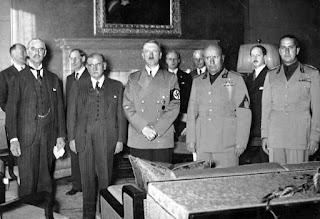Designado por TIME en 1938
En 1938 la revista TIME seleccionó a Hitler
como la persona del año, recibiendo numerosas críticas por esto. Sin embargo, como
explicaron, no se trataba de premiar la bondad, el amor y la justicia de un
personaje sino la importancia histórica, en el momento. En el Tratado de Munich Hitler ganaba
importantes concesiones de las grandes potencias dominantes que trataban de
apaciguarlo con beneficios para Alemania. Neville
Chamberlain , Edouard Daladier y Benito Mussolini
pasaban a tener un papel secundario en el recuento de la historia.
Time
seleccionó a Adolf Hitler Man of the Year
en 1938 por la firma del Tratado de Munich que rompió con las
alianzas diplomáticas entre Francia y Gran Bretaña y los recientemente creados
países del este de Europa para
mantener a raya a Alemania. La tapa y
la editorial de Time no eran
favorables a Hitler. Lo mostraba en
una catedral tocando el himno del odio, con sus víctimas colgando de una rueda.
Time explicó lo que fue, tal vez, una
de sus más controversiales elecciones: “Hitler
se convirtió en 1938 en una de las fuerzas más poderosas en amenazar la
democracia y la libertad”.
Greatest single
news event of 1938 took place on September 29, when four statesmen met at the
Führerhaus, in Munich, to redraw the map of Europe. The three visiting
statesmen at that historic conference were Prime Minister Neville Chamberlain of Great Britain, Premier Edouard Daladier of France, and Dictator Benito Mussolini of Italy. But by all odds the dominating figure at
Munich was the German host, Adolf Hitler.
 |
| Chamberlain, Daladier, Hitler, Mussolini y Ciano en la firma del Tratado de Munich |
Führer of the
German people, Commander-in-Chief of the German Army, Navy & Air Force,
Chancellor of the Third Reich, Herr Hitler
reaped on that day at Munich the harvest of an audacious, defiant, ruthless
foreign policy he had pursued for five and a half years. He had torn the Treaty of Versailles to shreds. He had
rearmed Germany to the teeth— or as close to the teeth as he was able. He had
stolen Austria before the eyes of a horrified and apparently impotent world.
 |
| Adolf Hitler, persona del año |
All these events
were shocking to nations which had defeated Germany on the battlefield only 20
years before, but nothing so terrified the world as the ruthless, methodical, Nazi-directed events which during late
summer and early autumn threatened a world war over Czechoslovakia. When without loss of blood he reduced
Czechoslovakia to a German puppet state, forced a drastic revision of Europe's
defensive alliances, and won a free hand for himself in Eastern Europe by
getting a "hands-off" promise from powerful Britain (and later
France), Adolf Hitler without doubt became 1938's Man of the Year.
Most other world
figures of 1938 faded in importance as the year drew to a close. Prime Minister
Chamberlain's "peace with honor''
seemed more than ever to have achieved neither. An increasing number of Britons
ridiculed his appease-the-dictators policy, believed that nothing save abject
surrender could satisfy the dictators' ambitions.
Among many
Frenchmen there rose a feeling that Premier
Daladier, by a few strokes of the pen at Munich, had turned France into a second-rate power. Aping
Mussolini in his gestures and copying triumphant Hitler's shouting complex, the
once liberal Daladier at year's end was reduced to using parliamentary tricks
to keep his job.
During 1938
Dictator Mussolini was only a
decidedly junior partner in the firm of Hitler & Mussolini, Inc. His noisy
agitation to get Corsica and Tunis from France was rated as a weak bluff whose
immediate objectives were no more than cheaper tolls for Italian ships in the
Suez Canal and control of the Djibouti-Addis Ababa railroad.
Gone from the
international scene was Eduard Benes,
for 20 years Europe's "Smartest Little Statesman." Last President of
free Czechoslovakia, he was now a
sick exile from the country he helped found. Pious Chinese Generalissimo Chiang Kaishek, Man of 1937, was forced
to retreat to a "New" West China, where he faced the possibility of
becoming only a respectable figurehead in an enveloping Communist movement. If Francisco Franco had won the Spanish
Civil War after his great spring drive, he might well have been Man-of-the-Year
timber. But victory still eluded the Generalissimo and war weariness and
disaffection on the Rightist side made his future precarious.
Para saber
Arthur
Neville Chamberlain (1869 –1940) fue Primer Ministro del Reino
Unido desde mayo de 1937 hasta mayo de 1940. Chamberlain es mejor conocido
por su política exterior de apaciguamiento, y en particular por su firma del Acuerdo de Munich en 1938, otorgando a
Alemania la región de los Sudetes de
habla alemana, de Checoslovaquia. Cuando Adolf
Hitler invadió Polonia, el Reino
Unido declaró la guerra a Alemania el 3 de septiembre de 1939, y Chamberlain
dirigió a Gran Bretaña durante los primeros ocho meses de la Segunda Guerra
Mundial.
La reputación de Chamberlain sigue siendo
controvertida entre los historiadores, ya que la alta estima inicial hacia él
fue erosionada completamente por libros como Guilty Men, publicado en julio de 1940, que culpaba a Chamberlain y
sus asociados por el acuerdo de Munich y por supuestamente no preparar al país
para la guerra.
Man of the Year - TIME magazine 1938
Algunos episodios de Hitler durante su “reinado”. Algunos
de los comentarios debajo del video son lamentables
Artículos
relacionados
Esto es parte del archivo Las Revistas del Abuelo
No comments:
Post a Comment